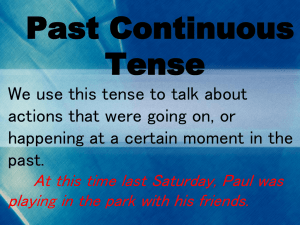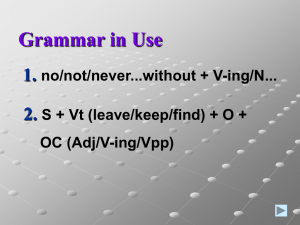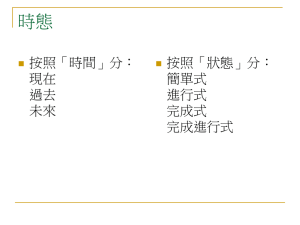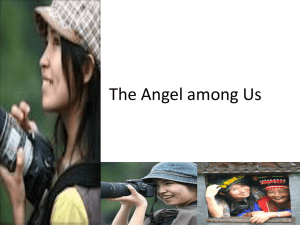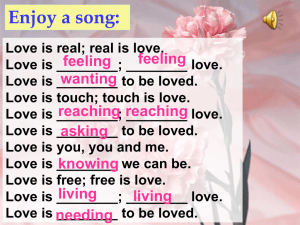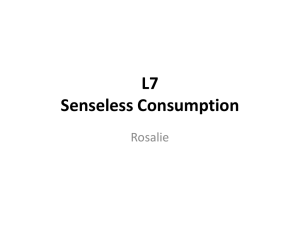Degrees of Wanting to Do Something
advertisement
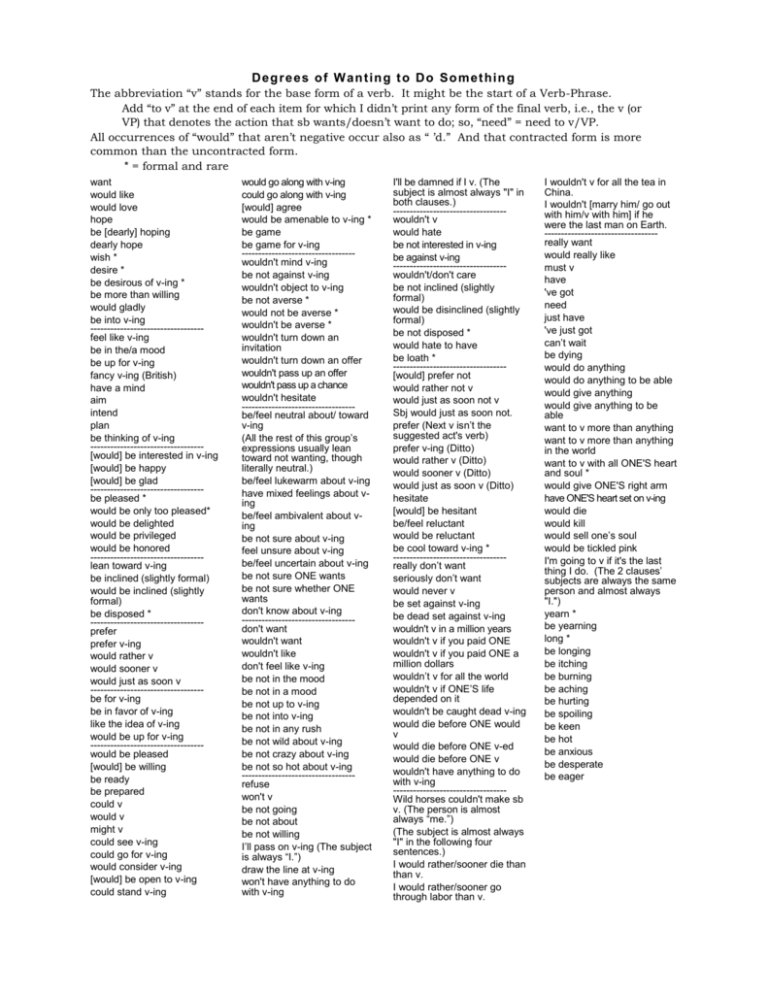
Deg r e es of W an tin g t o Do So met hin g The abbreviation “v” stands for the base form of a verb. It might be the start of a Verb-Phrase. Add “to v” at the end of each item for which I didn’t print any form of the final verb, i.e., the v (or VP) that denotes the action that sb wants/doesn’t want to do; so, “need” = need to v/VP. All occurrences of “would” that aren’t negative occur also as “ ’d.” And that contracted form is more common than the uncontracted form. * = formal and rare want would like would love hope be [dearly] hoping dearly hope wish * desire * be desirous of v-ing * be more than willing would gladly be into v-ing ---------------------------------feel like v-ing be in the/a mood be up for v-ing fancy v-ing (British) have a mind aim intend plan be thinking of v-ing ---------------------------------[would] be interested in v-ing [would] be happy [would] be glad ---------------------------------be pleased * would be only too pleased* would be delighted would be privileged would be honored ---------------------------------lean toward v-ing be inclined (slightly formal) would be inclined (slightly formal) be disposed * ---------------------------------prefer prefer v-ing would rather v would sooner v would just as soon v ---------------------------------be for v-ing be in favor of v-ing like the idea of v-ing would be up for v-ing ---------------------------------would be pleased [would] be willing be ready be prepared could v would v might v could see v-ing could go for v-ing would consider v-ing [would] be open to v-ing could stand v-ing would go along with v-ing could go along with v-ing [would] agree would be amenable to v-ing * be game be game for v-ing ---------------------------------wouldn't mind v-ing be not against v-ing wouldn't object to v-ing be not averse * would not be averse * wouldn't be averse * wouldn't turn down an invitation wouldn't turn down an offer wouldn't pass up an offer wouldn't pass up a chance wouldn't hesitate ---------------------------------be/feel neutral about/ toward v-ing (All the rest of this group’s expressions usually lean toward not wanting, though literally neutral.) be/feel lukewarm about v-ing have mixed feelings about ving be/feel ambivalent about ving be not sure about v-ing feel unsure about v-ing be/feel uncertain about v-ing be not sure ONE wants be not sure whether ONE wants don't know about v-ing ---------------------------------don't want wouldn't want wouldn't like don't feel like v-ing be not in the mood be not in a mood be not up to v-ing be not into v-ing be not in any rush be not wild about v-ing be not crazy about v-ing be not so hot about v-ing ---------------------------------refuse won't v be not going be not about be not willing I’ll pass on v-ing (The subject is always “I.”) draw the line at v-ing won't have anything to do with v-ing I'll be damned if I v. (The subject is almost always "I" in both clauses.) ---------------------------------wouldn't v would hate be not interested in v-ing be against v-ing ---------------------------------wouldn't/don't care be not inclined (slightly formal) would be disinclined (slightly formal) be not disposed * would hate to have be loath * ---------------------------------[would] prefer not would rather not v would just as soon not v Sbj would just as soon not. prefer (Next v isn’t the suggested act's verb) prefer v-ing (Ditto) would rather v (Ditto) would sooner v (Ditto) would just as soon v (Ditto) hesitate [would] be hesitant be/feel reluctant would be reluctant be cool toward v-ing * ---------------------------------really don’t want seriously don’t want would never v be set against v-ing be dead set against v-ing wouldn't v in a million years wouldn't v if you paid ONE wouldn't v if you paid ONE a million dollars wouldn’t v for all the world wouldn't v if ONE’S life depended on it wouldn't be caught dead v-ing would die before ONE would v would die before ONE v-ed would die before ONE v wouldn't have anything to do with v-ing ---------------------------------Wild horses couldn't make sb v. (The person is almost always “me.”) (The subject is almost always "I" in the following four sentences.) I would rather/sooner die than than v. I would rather/sooner go through labor than v. I wouldn't v for all the tea in China. I wouldn't [marry him/ go out with him/v with him] if he were the last man on Earth. ---------------------------------really want would really like must v have 've got need just have 've just got can’t wait be dying would do anything would do anything to be able would give anything would give anything to be able want to v more than anything want to v more than anything in the world want to v with all ONE'S heart and soul * would give ONE'S right arm have ONE'S heart set on v-ing would die would kill would sell one’s soul would be tickled pink I'm going to v if it's the last thing I do. (The 2 clauses’ subjects are always the same person and almost always "I.") yearn * be yearning long * be longing be itching be burning be aching be hurting be spoiling be keen be hot be anxious be desperate be eager Where this file (that you are reading) comes from: http://classes.berklee.edu/dmaisel/After%20ESL-1/academic%20reference/lists%20of%20related%20verbs/want or not want to do it.full.doc Password: read User Name: After ESL-1 Categories for Sorting the List’s Items These categories were the basis for almost all of the border lines that were drawn in the above list. WANT TO Verb: Temporary W hen the W anting subject might not be t he only Doing subject Hyper bolic Intense Moderate Mature/Formal Mild APPROXIM ATELY NEUTR AL: Ver y mild want ing (almost neutral) Negative of the opposite; so, closer to wanting than to not wanting Neutral Complying DON’ T W ANT TO Verb: Ref using In a comparison with how much doing so mething else is want ed Hinting Mild Mature/Formal Moderate Intense Hyper bolic “Badl y” The following verbs are commonly modified by the adverb “badly,” in which “bad” doesn’t mean the opposite of “good.” Here, this adverb intensifies the urgency of the wanting. The placement of “badly” in a sentence is shown in the following examples. WANT I want to v badly. / I badly want to v. / I want badly to v. NEED I need to v badly. / I badly need to v. / I need badly to v. HAVE I have to v badly. 'VE GOT I've got to v badly. 'VE GOTTA V I've gotta v badly. GOTTA V I gotta v badly. YEARN I yearn to v badly. / I yearn badly to v. BE YEARNING I'm yearning to v badly. / I'm yearning badly to v. LONG I long to v badly. / I long badly to v. BE LONGING I'm longing to v badly. / I'm longing badly to v. BE ITCHING I'm itching to v badly. / I'm itching badly to v. BE ACHING I'm aching to v badly. / I'm aching badly to v. “In the w orst w ay” All the verbs in the above list of verbs that are modified by “badly” are also modified by “in the worst way,” which intensifies the urgency of the wanting more intensely than “badly” does. It means “desperately.” Its register is colloquial. Its placement in a sentence is the same as for “badly” except that it rarely goes between the subject and “want” or “need.” Like “badly,” it usually goes at the end of the Verb Phrase that is the complement of the listed verb. Neutral (but not listed because it doesn't include the final verb): Sbj could take it or leave it.

